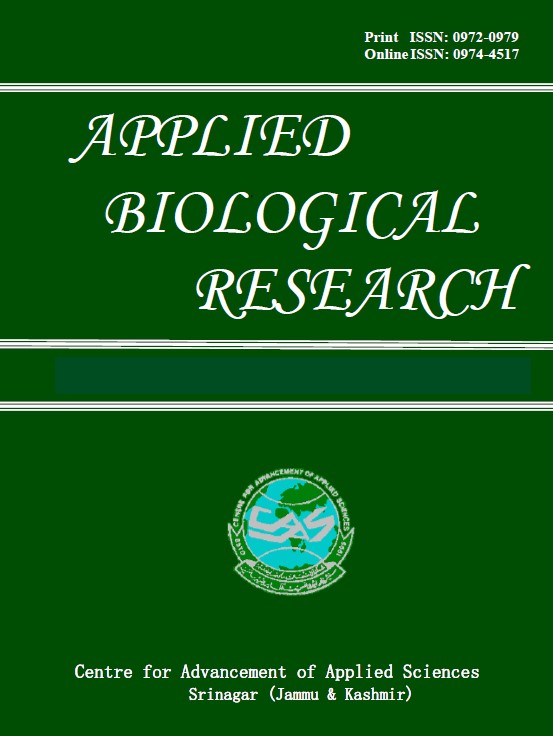First Record Of Necrotic Enteritis Caused By Clostridium Perfringens In Chickens From Chattisgarh (India)
DOI:
https://doi.org/10.48165/Keywords:
RECORD, NecroticAbstract
The outbreak of several devastating diseases is one of the major constraints causing economic loss so discouraging poultry rearing in India. Intestinal diseases are an important concern for modern poultry industry because of low productivity, increased mortality and the associated contamination of poultry products with pathogenic bacteria and their toxins. Necrotic enteritis is one of the world´s most common diseases which cause mortality up to 10-40% (McDevit et al., 2006). Necrotic enteritis caused by Clostridium perfringens in chickens is a risk to public health through food chain (Van Immerseel et al., 2004). Necrotic enteritis in chicken due to C. perfringens has not earlier been reported from Chhattisgarh (India).
Downloads
References
Cooper, K.K and Songer, J.G. 2010. Virulence of Clostridium perfringens in an experimental model of poultry necrotic enteritis. Veterinary Microbiology, 142: 323-328.
Craven, S.E., Stern, N.J., Bailey, J.S and Cox, N.A.2001. Incidence of Clostridium perfringens in broiler chickens and their environment during production and processing. Avian Diseases, 45: 887-896.
Dahiya, J.P., Hoehler, D., Van Kessel, A.G and Drew, M.D. 2007. Dietary encapsulated glycine influences Clostridium perfringens and Lactobacilli growth in the gastrointestinal tract of broiler chickens. Journal of Nutrition, 137: 1408-1414.
Das, A., Mazumder, Y., Dutta, B.K., Shome, B,R., Bujarburuah, K.M and Kumar, A. 2008. Clostridium perfringens type A from broiler chicken with necrotic enteritis. International Journal of Poultry Science, 7: 601-609.
Eyre, J.W.H. 2009. The Project Gutenberg eBook of The Elements of Bacteriological Technique: A Laboratory Guide for Medical, Dental and Technical Students (2nd edn.). eBook #27713 ISO 8859-1.
Fayez, M.M., Abdelaziz, A.M. and Al-Musallam, A. 2013.Characterization of toxigenic strains of Clostridium perfringens type A from broiler chicken with necrotic enteritis. International Journal of Advanced Research, 1: 321-327.
McDevit, R.M., Brooker, J.D., Acamovic, T. and Sparks, N.H.C. 2006. Necrotic enteritis; continuing challenge for the poultry industry. World’s Poultry Science Journal, 62: 221- 247. Miah, M.S., Asaduzzaman, M., Sufian, M.A. and Hosain, M.M. 2011. Isolation of Clostridium perfringens, causal agents of necrotic enteritis in chickens. Journal of the Bangladesh Agricultural University, 9: 97-102.
Nairn, M.E. and Bamford, V.W. 1967. Necrotic enteritis of broiler chickens in Western Australia. Australian Veterinary Journal, 43: 49-54.
Rhodehamel, G., Bruce, H.L., Hunter, D.B., Parreira, V.R., Kulkarni, R.R., Jiang, Y.F., Prescott, J.F. and Boerlin, P. 1998. Multilocus Sequence Typing Analysis of Clostridium perfringens Isolates from Necrotic Enteritis Outbreaks in Broiler Chicken Populations. Department of Pathobiology, Ontario Veterinary College, University of Guelph, Ontario, Canada.
Sawale, G.K., Mane, D.V., Shelke, V.M. and Bharkad, G.P.2010. Occurrence of necrotic enteritis in commercial layer chickensraised in cages.Indian Journal of Veterinary Pathology, 34: 138-140. Shamimuzzaman, A.H.M. 1999. Characterization of Clostridium perfringens Isolated from Goat and its Antibiotic Sensitivity. M.Sc. thesis. Department of Microbiology and Hygiene, Faculty of Veterinary Science, Bangladesh Agricultural University, Mymensingh, Bangladesh. Shanmugasamy, M., Adhimoolam, B. and Natarajan, D. 2012. Necrotic enteritis in broiler and layer farms in Tamilnadu. International Journal for Agro-Veterinary and Medical Sciences, 6: 241- 249.
Van Immerseel, F., De Buck, J., Pasmam, F., Huyghebaert, G., Haesebrouck, F. and Ductelle, R. 2004. Clostridium perfringens in poultry: An emerging threat for animal and public health. Avian Pathology, 33: 537-549.

